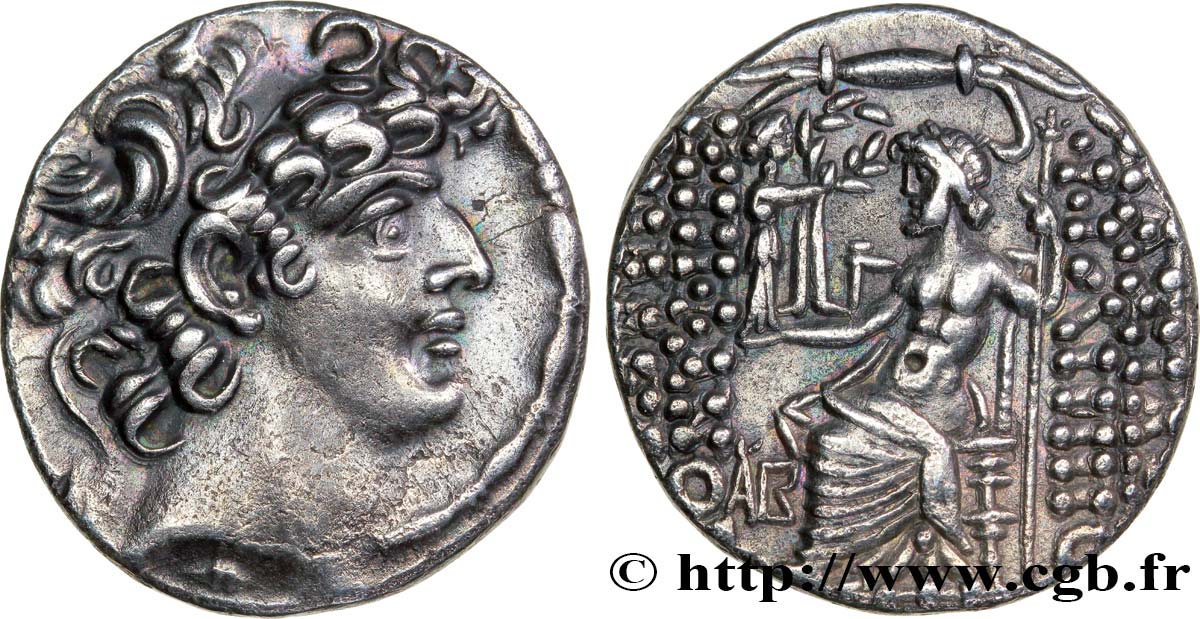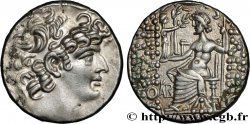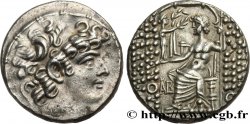Live auction - bpv_349868 - SYRIA - ROMAN PROVINCE - AULUS GABINIUS Tétradrachme syro-phénicien
You must signin and be an approved bidder to bid, LOGIN TO BID. Accounts are subject to approval and the approval process takes place within 48 hours. Do not wait until the day a sale closes to register. Clicking on "BID" constitutes acceptance of the terms of use of cgb.fr private live auctions.
Bids must be placed in whole Euro amounts only. The sale will start closing at the time stated on the item description; any bids received at the site after the closing time will not be executed. Transmission times may vary and bids could be rejected if you wait until the last second. For further information check the Live auction FAQ
All winning bids are subject to a 18% buyer’s fee.
All winning bids are subject to a 18% buyer’s fee.
| Estimate : | 850 € |
| Price : | 620 € |
| Maximum bid : | 630 € |
| End of the sale : | 31 March 2015 14:12:20 |
| bidders : | 3 bidders |
Type : Tétradrachme syro-phénicien
Date: 57-55 AC.
Mint name / Town : Antioche, Syrie, Séleucie et Piérie
Metal : silver
Diameter : 26,5 mm
Orientation dies : 12 h.
Weight : 15,24 g.
Rarity : R1
Coments on the condition:
Exemplaire sur un flan ovale bien centré des deux côtés. Très belle tête de style hellénisant. Revers de style fin. Très jolie patine de collection ancienne avec des reflets dorés. Conserve la plus grande partie de son brillant de frappe et de son coupant d’origine
Catalogue references :
Obverse
Obverse legend : ANÉPIGRAPHE.
Obverse description : Tête diadémée de Philippe Philadelphe à droite, entouré de la stemma.
Reverse
Reverse description : Zeus nicéphore assis à gauche sur un trône avec dossier, tenant une Niké de la main droite et un sceptre long de la main gauche ; monogramme dans le champ à gauche.
Reverse legend : BASILEWS/ FILIPPOU/ EPIFANOUS/ FILADELFOU
Commentary
Première frappe romaine en argent dans la région, commence la série des tétradrachmes au type de Philippe Philadelphe.
On attribue cette frappe à partir du monogramme du revers qui se lit AVB pour Aulus Gabinius. Général et homme politique, voir l’article de wikipedia le concernant à http://fr.wikipedia.org/wiki/Aulus_Gabinius , il assurera le pouvoir romain dans la région.
Avec cette monnaie, c’est une ère nouvelle qui commence et qui clôt pour le Proche-Orient le chapitre ouvert par les conquêtes d’Alexandre.
Les émissions au type immobilisé de Philippe Philadelphe sont très importantes car elles illustrent parfaitement la logique impériale de la colonisation romaine. Autant une conquête de revendication territoriale d'expansion de l'espace vital autour d'un pouvoir central de type national va chercher à éliminer toutes les symboliques locales dans les pays conquis pour imposer celles du conquérant (selon le principe de un peuple, un roi, une foi, une loi), autant un empire va laisser cohabiter des symboliques différentes. C'est ce qui se passe en Syrie, Palestine et Phénicie dans les premiers temps de l'expansion. Loin d'imposer le denier ou la typologie romaine, les Latins vont respecter la métrologie et même le type. Il faudra attendre les rares émissions d'Auguste au revers du Zeus, presque cinquante ans, pour voir apparaître le portrait du Prince sur les monnaies locales en argent.
Style classique pour l’émission avec les mèches traitées en “serpents”. On remarquera le style du plissé de l’himation de Zeus que nous retrouverons exactement dans la première émission au portrait d’Auguste.
Dans la base TSP que maintenait par Michel Prieur, soixante dix-neuf exemplaires étaient répertoriés.
First Roman silver strike in the region, begins the series of tetradrachms of the type of Philip Philadelphus.
This strike is attributed from the monogram on the reverse which reads AVB for Aulus Gabinius. General and politician, see the Wikipedia article about him at http://fr. Wikipedia. org/wiki/Aulus_Gabinius, he will ensure Roman power in the region.
With this coin, a new era begins and closes for the Near East the chapter opened by the conquests of Alexander..
The immobilized type emissions of Philippe Philadelphe are very important because they perfectly illustrate the imperial logic of Roman colonization.. Just as a conquest of territorial claim of expansion of the living space around a central power of national type will seek to eliminate all local symbols in the conquered countries to impose those of the conqueror (according to the principle of one people, one king, one faith, one law), so an empire will allow different symbols to coexist. This is what happened in Syria, Palestine and Phoenicia in the early days of expansion.. Far from imposing the denarius or Roman typology, the Latins will respect metrology and even the type. It was not until the rare issues of Augustus on the reverse of the Zeus, almost fifty years later, that the portrait of the Prince appeared on local silver coins..
Classic style for the show with the strands treated in “snakes”. We will notice the style of the pleating of the himation of Zeus that we will find exactly in the first emission with the portrait of Augustus.
In the TSP database maintained by Michel Prieur, seventy-nine examples were listed.
On attribue cette frappe à partir du monogramme du revers qui se lit AVB pour Aulus Gabinius. Général et homme politique, voir l’article de wikipedia le concernant à http://fr.wikipedia.org/wiki/Aulus_Gabinius , il assurera le pouvoir romain dans la région.
Avec cette monnaie, c’est une ère nouvelle qui commence et qui clôt pour le Proche-Orient le chapitre ouvert par les conquêtes d’Alexandre.
Les émissions au type immobilisé de Philippe Philadelphe sont très importantes car elles illustrent parfaitement la logique impériale de la colonisation romaine. Autant une conquête de revendication territoriale d'expansion de l'espace vital autour d'un pouvoir central de type national va chercher à éliminer toutes les symboliques locales dans les pays conquis pour imposer celles du conquérant (selon le principe de un peuple, un roi, une foi, une loi), autant un empire va laisser cohabiter des symboliques différentes. C'est ce qui se passe en Syrie, Palestine et Phénicie dans les premiers temps de l'expansion. Loin d'imposer le denier ou la typologie romaine, les Latins vont respecter la métrologie et même le type. Il faudra attendre les rares émissions d'Auguste au revers du Zeus, presque cinquante ans, pour voir apparaître le portrait du Prince sur les monnaies locales en argent.
Style classique pour l’émission avec les mèches traitées en “serpents”. On remarquera le style du plissé de l’himation de Zeus que nous retrouverons exactement dans la première émission au portrait d’Auguste.
Dans la base TSP que maintenait par Michel Prieur, soixante dix-neuf exemplaires étaient répertoriés.
First Roman silver strike in the region, begins the series of tetradrachms of the type of Philip Philadelphus.
This strike is attributed from the monogram on the reverse which reads AVB for Aulus Gabinius. General and politician, see the Wikipedia article about him at http://fr. Wikipedia. org/wiki/Aulus_Gabinius, he will ensure Roman power in the region.
With this coin, a new era begins and closes for the Near East the chapter opened by the conquests of Alexander..
The immobilized type emissions of Philippe Philadelphe are very important because they perfectly illustrate the imperial logic of Roman colonization.. Just as a conquest of territorial claim of expansion of the living space around a central power of national type will seek to eliminate all local symbols in the conquered countries to impose those of the conqueror (according to the principle of one people, one king, one faith, one law), so an empire will allow different symbols to coexist. This is what happened in Syria, Palestine and Phoenicia in the early days of expansion.. Far from imposing the denarius or Roman typology, the Latins will respect metrology and even the type. It was not until the rare issues of Augustus on the reverse of the Zeus, almost fifty years later, that the portrait of the Prince appeared on local silver coins..
Classic style for the show with the strands treated in “snakes”. We will notice the style of the pleating of the himation of Zeus that we will find exactly in the first emission with the portrait of Augustus.
In the TSP database maintained by Michel Prieur, seventy-nine examples were listed.








 Report a mistake
Report a mistake Print the page
Print the page Share my selection
Share my selection Ask a question
Ask a question Consign / sell
Consign / sell
 Full data
Full data









